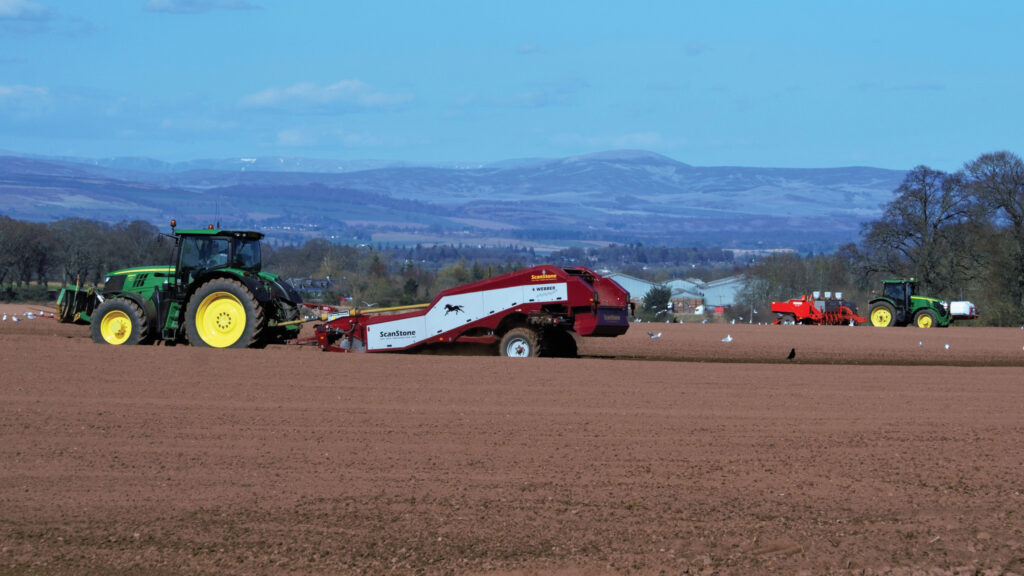Updated guidance for virus-free potatoes released
 © Christina Simpson/Alamy Stock Photo
© Christina Simpson/Alamy Stock Photo A document designed to help the seed potato industry tackle damaging viruses has been updated this spring, making it easier for growers to understand and implement critical control measures.
Aphid-borne viruses such as potato virus Y (PVY) and potato leaf roll virus (PLRV) have long been a background threat to production, but over recent years, there has been an upward trend of disease found in certified seed, particularly PLRV.
This is due to several factors, but most notably the warming climate, a dwindling insecticide arsenal, and aphid insensitivity to the products growers do have at their disposal.
See also: Research reveals critical two-month period for potato yields
Downgraded crops
Although levels dropped in 2024 – 8.4% of Scottish seed crops were downgraded for virus and 0.8% failed, compared with 15.4% downgraded and 1.8% failed the previous year – it remains a major concern for the industry.
To support growers in managing aphid-borne viruses, the Scottish Aphid Borne Virus Working Group (SABVWG) first issued a guidance document for seed potato producers in 2021.
The Six Steps to Effective Virus Management in Certified or Home Saved Seed outlines an integrated approach whereby taking all the individual steps will ultimately help reduce the viral health of seed.
Although the document is produced by representatives, advisers, and regulators of the Scottish seed sector, the guide is useful for seed and ware producers across the UK.
The full document is hosted on the SASA website and has detailed information about each step. Last year, it was boiled down into a one-page guidance document to simplify messaging to industry.
The content of the Six Steps is constantly under review and SAC Consulting’s Kyran Maloney tells Farmers Weekly the SABVWG has just agreed an updated document for 2025.
Clearer messaging
He points out it was a good resource anyway, but the new version has refined some of the information and should help hammer home each important action more clearly.
“The biggest visible change to the document is splitting the Six Steps in half, with the first three steps focusing on what growers and agronomists can do to control virus specifically,” explains Kyran.
“That includes understanding levels of virus in your input seed or your variety’s resistance status and virus propensity, which is a measure of how frequently virus has been seen in that variety compared to others.”
The second three focus on aphid vector control, urging the use of aphid monitoring services to target the appropriate aphicide programmes, right up until the haulm of the crop is dead.
Kyran adds that until this year, there has also been a spin-off document for ware producers known as the Four Steps, that reminded those producing potatoes for human consumption of their virus-management obligations.
Having the two documents was potentially confusing.
Because it is the responsibility of the whole industry to confront the virus issue and there was a lot of overlap between the two documents, SABVWG is now merging all information into one.
This new, all-encompassing document is now titled The Six Steps to ensure effective virus management in potato crops.
“Clearly there are steps that are more relevant to seed growers than to ware, but there is so much in common, so it’s now one document for virus control and we encourage all growers to read it,” says Kyran.
Team effort
He points out that as much as the industry tries to segregate seed crops, there is inevitably crossover on a landscape scale, and everyone’s management practices can have consequences for others.
For seed producers, this could be downgraded seed stocks, and for ware, poorer quality and marketable yield caused by symptoms of virus infection.
“It needs to be a big team effort. I think if we get into a situation where everybody thinks it’s someone else’s problem, the problem of aphid-borne virus will never be properly managed.”
Full guidance
The Scottish Aphid Borne Virus Working Group comprises of Science & Advice for Scottish Agriculture (Sasa), SRUC, Scottish Agronomy, James Hutton Institute, Seed Potato Organisation, British Potato Trade Association, McCain, Agrovista and the Pre Basic Growers Association.
See the The Six Steps to ensure effective virus management in potato crops document (PDF) or visit the Sasa website. GB Potatoes also hosts the guide on its website.

